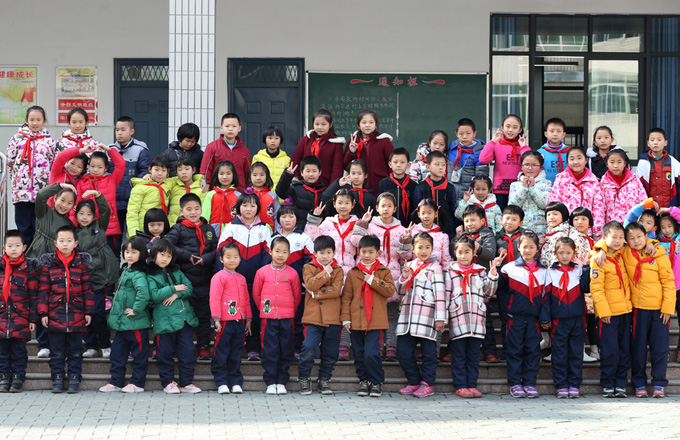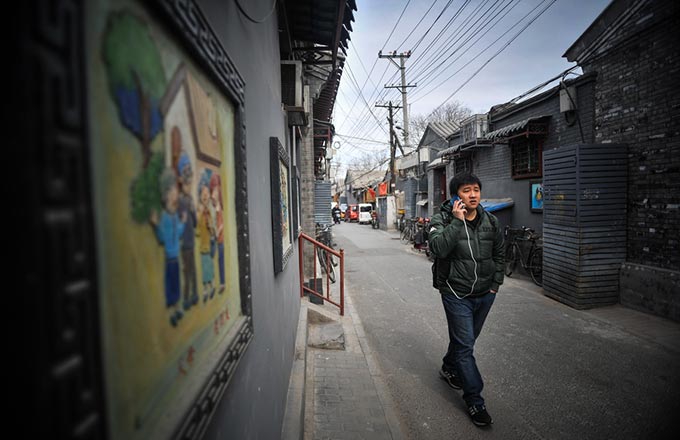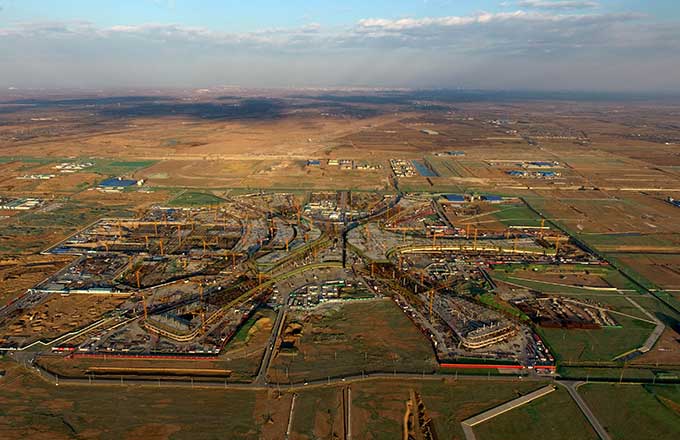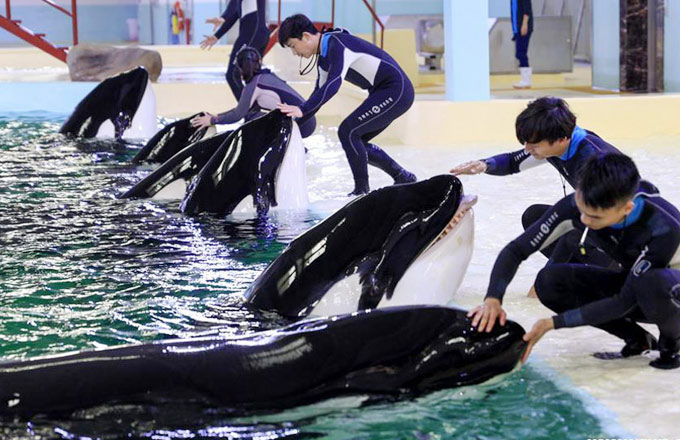China issues white paper on judicial reform of Chinese courts
V. Improving the Judicial Accountability System
It is an objective requirement of the law of justice that one who tries a case shall have the power to decide the case and be responsible for his decision. In September 2015, the Supreme People's Court promulgated certain opinions on improving the judicial accountability system in the people's courts, to guide the pilot courts in the reform of the judicial accountability system. Since the national conference on pushing forward the reform of the judicial system held in July 2016, the reform of the judicial accountability system has been implemented in the courts nationwide in an all-round way on the basis of judge quotas and centering on the reform of the operating mechanism of adjudicative power and the accountability system for judges and collegiate panels handling cases.
Exploring the mode of judicial team. The primary and intermediate pilot courts have optimized the staffing in light of their actual situations, organized judicial teams comprising judges, judge assistants, clerks and other auxiliary personnel, formulated respective lists of responsibilities of judges, judge assistants and clerks, established the new judicial work mechanism with judges at the core and the team members cooperating with each other closely, thereby improving the judicial efficiency by more than 20% generally. Futian District People's Court in Shenzhen, Guangzhou has established 59 judicial teams each comprising 1 collegial panel + 3 judge assistants, or 1 judge + 1 judge assistant, or 1 judge + N judge assistants or otherwise, and 15 quick-track sentencing, quick mediation, quick trial and quick enforcement teams comprising 11.6% of regular judges and 12.4% of auxiliary personnel of the Court, which handled about 50% of the cases newly accepted by the Court. From June to November 2016, each judge of the Court had concluded 1,129 cases on average. Huaxi People's Court in Guiyang, Guizhou has organized criminal judicial teams, each comprising one judge, one judge assistant and one clerk, and civil judicial teams, each comprising one judge, two judge assistants and two clerks. Since the launch of the said reform, the Court's number of the cases concluded by each judge on average, the rate of cases the judgments on which were announced at the court and the average duration of trial of cases have been significantly higher than the average levels of the City. Beijing No. 2 Intermediate People's Court has organized 44 relatively fixed judicial teams in its tribunals, each comprising three to five judges, revoked the fixed chief judge system, and had the judge responsible for a case act as the chief judge. Shanghai No. 2 Intermediate People's Court has assigned at least one judge assistant to each collegial panel, and defined the regulations on judge assistants' participation in adjudicative work, thereby effectively reducing the routine work undertaken by judges in judicial procedures. The circuit courts of the Supreme People's Court have randomly organized collegiate panels, each comprising one chief judge, one judge assistant and one clerk to adjudicate cases.
Reforming the mechanism for execution of written judgments. The pilot courts have revoked the system of asking for instructions and examination and approval level by level, established the system that one who tries a case shall have the power to decide the case and be responsible for his decision. Except the cases considered and decided by the judicial committees, the court presidents no longer review or sign the written judgments on the cases of which they have not directly participated in the trial. In Shanghai, since the launch of the reform, the ratio of the cases directly decided by the sole judges or collegiate panels has reached 99.99%, and only 0.1% of the cases concluded have been submitted to the judicial committees for discussion. The judgments made by the circuit courts of the Supreme People's Court will be directly issued after being signed by all the members of a collegiate panel.
Promoting regular handling of cases by court presidents. All the pilot courts have set quotas for handling of cases by their presidents registered as judges and specified the duties of court presidents to handle cases, so that many officials of intermediate and primary courts now become the main force in case handling. The court presidents in Shanghai handled 68,000 cases in total in 2015, up 51.4% year on year, and 100,200 cases in total in 2016, up 23.54% year on year. In Beijing, the number of cases handled by court presidents increased by 52% year on year in 2016, while the number of cases submitted to the judicial committees for discussion decreased by 45% year on year. From 2015 to 2016, the court presidents in Jiangsu handled 1,099,000 cases in total, accounting for 38.5% of the total cases concluded. Guangdong Higher People's Court promulgated guidelines on handling of cases by court presidents, expressly providing that the court presidents registered as judges shall take the lead in handling four types of cases, including major, difficult and complicated cases and those cases of guiding significance in application of law. In 2016, the presidents of courts at three levels in Guangdong participated in the handling of 701,600 cases and presided at the trials of 482,200 cases in total, up 24.72% and 30.21% year on year respectively, and presided at the trials of 88,700 major, difficult and complicated cases, up 31.39% year on year. The pilot courts have given full play to the rich experience of court presidents in adjudication, and organized collegiate panels comprising presidents, vice presidents and members of judicial committees to directly adjudicate major, difficult and complicated cases. The senior judges have taken the lead in handling major and difficult cases, for example, He Rong, second-grade judge and Vice President of the Supreme People's Court, presided at the re-trial of the Archangelos Gabriel salvage case, and Tao Kaiyuan, second-grade judge and Vice President of the Supreme People's Court, presided at the trial of administrative disputes over "Qiaodan" trademark.
Standardizing the management and supervision over trials. Each pilot court has formulated a list of powers and responsibilities of court presidents to regulate the court presidents' exercise of the power of management and supervision over trials, and provides that the court presidents may only express their opinions on specific cases publically through the conference of professional judges and the judicial committee, and such opinions shall be wholly recorded on the working platform. The Supreme People's Court no longer appraises the performance of or ranks the higher people's courts, and requests the higher people's courts to cancel unreasonable indicators of appraisal for the courts within their respective jurisdictions, specifically, except the rate of conclusion of cases within the time limit and other necessary restraint indicators required to be kept under the law, all the other indicators of appraisal shall only be adopted for reference in statistics and analysis. In order to promote the standardization of judicial practices, Tianjin Higher People's Court has issued 14 normative documents on judicial practices in two batches, covering judicial procedures, judicial discretion, case quality, judicial powers and responsibilities, judicial transparency, litigation services and other aspects. Shenzhen Intermediate People's Court in Guangdong promulgated the guidelines on the judicial accountability system to promote the exercise of judicial powers under the guidance of strict rules and standards. Chengdu Intermediate People's Court in Sichuan has established a judicial procedure management system to follow up, give hints and pre-warnings on and supervise 183 links in the judicial procedure, and, in terms of the turnover of appeals which is apt to be out of control, has litigation service centers accept appeals and turn over the files of appeal cases in a centralized manner.
Establishing the system of conference of professional judges. The pilot courts have generally established the system of conference of professional judges to provide the collegiate panels with advice on correct application of law and opinions for their reference. Beijing No. 3 People's Court has improved the rules on conference of judges, entered meeting minutes into the sub-files for reference, and through summary of the results of the conferences of judges, formulated the guidelines on the adjudication of over 20 types of cases, including cases of labor dispute, traffic accidents and rural land contract, thereby unifying the standard of adjudication. Chongqing No. 2 Intermediate People's Court has established the systems of joint conference of judges in the tribunals and the cross-departmental conference of judges, with about 80% of the advice expressed at the conferences of judges being adopted and the number of cases submitted to the judicial committee for discussion being reduced by 42% year on year, thereby giving full play to the service and consultation functions of the conferences of judges and the function of filtration of the cases submitted to the judicial committee for discussion.
Improving the system of guiding cases and reference cases. The Supreme People's Court had formulated the detailed implementing rules for guiding cases, and published 77 guiding cases in 15 batches as at the end of 2016. The cases tried by the courts at all levels that are similar to any guiding cases published by the Supreme People's Court in terms of basic circumstances of the cases and applicable laws shall be adjudicated by reference to the main reasons for the adjudication of such guiding cases and refer to such guiding cases in the statement of reasons for judgments. In April 2015, the Supreme People's Court established the IP Case Guiding and Research (Beijing) Base at the Beijing IP Court to summarize and publish rules and experience in respect of adjudication of IP cases in a timely manner. Hainan Higher People's Court has established a database of reference cases comprising 318 selected reference cases of the Province, and given pre-job training to registered judges, so as to effectively reduce the phenomenon of "different judgments on the same case". Shenzhen Intermediate People's Court in Guangdong has promulgated the guidelines on the adjudication of 78 criminal, civil, administrative, enforcement and other cases for reference in the adjudication of similar cases.
Reforming the system of judicial committee. The Supreme People's Court has promulgated the guidelines on the reform of the system of judicial committee, requesting strengthening the guiding function of the judicial committees in summarizing experience in adjudication, unifying the application of law and discussing and deciding on major issues in respect of adjudication. The pilot courts have generally adopted the mechanism of pre-filtration of the issues submitted to the judicial committees for discussion, and defined the scope of the cases that should be submitted to the judicial committees for discussion. In addition to the cases required by the law and the major and complicated cases involving foreign affairs, security and social stability of the State, the judicial committees shall focus on the application of law in major, difficult and complicated cases. Since the launch of the reform, the number of cases submitted to the judicial committees in all regions for discussion has decreased significantly. The whole course of discussions by the judicial committees shall be tape-recorded or videotaped; the systems of appraisal of performance of the judicial committee and internal notification of the result of appraisal have been established and improved; and all the members of the judicial committee present and voting at the meetings of the judicial committees shall sign the meeting minutes.
Improving the system of lifelong responsibility for the quality of cases handled and the accountability system for misjudged cases. The Supreme People's Court has promulgated the relevant regulations, expressly providing that a judge shall be responsible for his/her performance of duties of adjudication, and for the quality of cases handled by him/her for life, and that a judge shall be held liable for illegal adjudication if he/she intentionally violates the laws in adjudication or commits any gross negligence resulting in any wrong judgment and causing any serious consequences; specifying the circumstances and conditions for exemption from responsibility for adjudication; on the principle that one who has powers shall assume corresponding responsibilities and one who is derelict in his duty shall be held liable, specifying the responsibility for supervision and management that a court president shall assume if he/she improperly exercises any power of supervision and management over trials due to intentional or gross negligence; and improving the procedures for the determination, investigation, review and affixation of responsibility in respect of misjudged cases to strictly hold judges liable for illegal adjudication.
Establishing the system for punishing judges. On October 12, 2016, the Supreme People's Court and the Supreme People's Procuratorate jointly promulgated the opinions on the establishment of a system for punishing judges and public prosecutors, which require the establishment of a system for punishing judges under which the people's courts and judge punishment committees assume their respective responsibilities, and the establishment of judge punishment committees at the provincial level comprising civilians and judge representatives from courts at the three levels, which shall be responsible for reviewing whether any judge has breached the responsibility for adjudication or committed any intentional or gross negligence or should assume the liability for illegal adjudication, and proposing punishments to be meted out. The judge punishment committees generally review cases by means of hearing, so as to safeguard the rights of the judges involved to make statements and defenses and produce evidences, and realize both goals of imposing punishments in a timely manner according to law and ensuring job security.
Establishing the system of recording and affixing responsibilities for interference with cases by insiders of judicial organs. The Supreme People's Court has formulated the measures for enforcing the regulations on recording and affixing responsibilities for interference with cases by insiders of judicial organs, which require that the people's courts at all levels shall each establish a special database of interference with cases by insiders of judicial organs in their case information management systems; and the case handlers of the people's courts shall record the names of insiders of judicial organs who interfere with the cases handled by them outside the legal procedures or relevant working procedures, the departments they work in, their positions and the specific circumstances of such interference in the said special databases in a timely, complete and truthful manner, and keep the relevant documentations.
Improving the trial-level system. In order to adapt to the situations of economic and social development, meet the needs of civil lawsuits and reasonably defining the respective functions of the courts at four levels in the trial of civil and commercial cases, the Supreme People's Court adjusted the thresholds for the jurisdiction of the higher people's courts and intermediate people's courts over civil and commercial cases of first instance, and increased the threshold of the subject value of civil and commercial cases of first instance under the jurisdiction of primary courts; provided that the cases of disputes concerning marriage, inheritance, family, property service, compensation for personal injuries, reputation right, traffic accidents and labor and cases of mass disputes shall generally be subject to the jurisdiction of primary courts, while major, difficult and complicated cases, new types of cases and typical cases in terms of application of law may be adjudicated by a people's court at a higher level as determined by it in its sole discretion or at the request of a people's court at a lower level. In February 2015, the Supreme People's Court promulgated the judicial interpretations on certain issues concerning strict application of order for retrial and remand for retrial in the supervisory procedure for the trial of civil cases, which unify the standard for order for retrial and review of cases, strictly prohibit remand for retrial at will, and request that if a people's court at a higher level orders to retry a case or remands a case for retrial, it shall elaborate in the ruling the detailed reasons for such order for retrial or remand for retrial.
Pushing forward the reform of the mechanism of separating complicated cases from simply cases. On September 12, 2016, the Supreme People's Court promulgated the opinions on furthering separation of complicated cases from simple cases and optimizing the allocation of judicial resources, instructing the people's courts at all levels to give full play to the functions of the multi-level litigation system, such as the special procedure, urge procedure, small-amount litigation procedure, quick-track sentencing procedure, summary procedure and ordinary procedure, adopt measures such as pre-litigation confirmation of addresses, pre-trial meeting, court trial focusing on essential factors, writ, exemplary litigation, professional trial, centralized management of auxiliary trial affairs, etc., make full use of the achievements in informatization, and use the ideas and means of reform to solve the contradiction of many cases for few persons, to seek the unity of judicial impartiality and efficiency. More than 90 primary courts in Jiangsu have established tribunals for quick-track adjudication of cases involving small amounts, each of which comprises one judge and one clerk, adopts the mode of adjudication focusing on essential factors, simplifies the written judgments, announces judgments at the court in principle, and concludes a case within 20 days on average, with nearly 70% of cases withdrawn after mediation. Shenyang Intermediate People's Court in Liaoning has actively implemented the system of pre-court meeting to handle procedural affairs, such as notification of rights and obligations and petition for challenge, prior to court trials, clarify the respective opinions of the plaintiffs and defendants, determine non-disputed facts, identify the points at issue and urge the parties involved to produce evidences relating to such points at issue; with respect to the cases the circumstances of which were simple and clear and the disputes involved in which were not serious, made effort to conclude such cases through mediation; with respect to difficult and complicated cases and cases involving serious disputes, attempted to sort out ideas about the court trials. Since the launch of the reform, the duration of court trial has been reduced by about 50 minutes on average. Wenling People's Court in Zhejiang has established a service management center, which has nine full-time servers, and developed service management software, opened its official WeChat account, strengthened coordination with the postal offices in service, and preliminarily realized informatization of the whole course and centralized and standard management of the service process, thereby improving the efficiency of service.

























